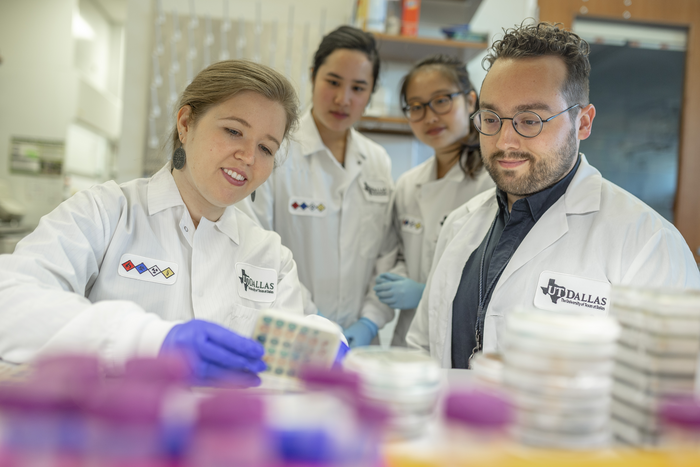Researchers at The University of Texas at Dallas have identified specific bacteria in the bladder that may indicate which postmenopausal women are more susceptible to recurrent urinary tract infections (UTIs), and they found that estrogen may play a role in reducing that susceptibility.

Credit: The University of Texas at Dallas
Researchers at The University of Texas at Dallas have identified specific bacteria in the bladder that may indicate which postmenopausal women are more susceptible to recurrent urinary tract infections (UTIs), and they found that estrogen may play a role in reducing that susceptibility.
“We found a very strong association between beneficial bacteria in the bladder and the use of estrogen hormone therapy in postmenopausal women,” said Dr. Nicole De Nisco, assistant professor of biological sciences in the School of Natural Sciences and Mathematics. “Estrogen is important not just in regulating reproductive processes, but also in shaping the chemical environment of the entire body. When you lose that hormone, you lose all the benefits that it provides.”
De Nisco is the corresponding author of a study published online Sept. 30 and in the Oct. 18 print edition of Cell Reports Medicine. The researchers found robust correlations between so-called “good” bacteria and urinary estrogens in postmenopausal women without a history of UTIs.
Urinary tract infections are among the most common adult bacterial infections and impart a particularly significant medical burden on women, with more than 50% of women suffering a UTI in their lifetimes. Age is one of the strongest associated risk factors for UTIs.
Working with Dr. Philippe Zimmern, a professor of urology at UT Southwestern Medical Center, the UTD research team tested 75 postmenopausal women who fell into three groups:
- Those who did not have a history of UTIs.
- Those who have recurrent UTIs and were experiencing one at the time of testing.
- Those who have recurrent UTIs but were not experiencing one at the time of testing.
Michael Neugent BS’13, MS’19, PhD’20, a postdoctoral fellow in De Nisco’s lab and first author of the article, said the research suggests that UTIs and estrogen shape the group of all microbes — called the microbiome — found in the urinary and genital tracts of postmenopausal women.
“What we found is that those women who are in between infections — those with a history of recurrent UTIs but currently UTI negative — had a microbiome that was full of microorganisms capable of causing disease of the urinary tract while having fewer good bacteria,” he said.
In contrast, many of the women who were taking estrogen therapy did not have the “bad” bacteria in their bladders. Researchers said the greater amount of estrogen found in the urine correlated with a predominance of good bacteria, such as Lactobacilli, in the microbiome.
The researchers also found that microbiomes of the women with recurrent UTIs contained more antibiotic resistance genes than those in women with no history of UTI. Antibiotic resistance genes can be exchanged between cells, allowing resistance to spread rapidly through a population of bacteria and thus making infections more difficult to treat.
While antibiotics have been somewhat effective in fighting disease-causing bacteria, De Nisco said the prescribing of antibiotics when they are not needed — which is accelerating antibiotic resistance — is one of the biggest hurdles in treating UTIs.
“We just can’t throw antibiotics at this problem or else we will never break the cycle of recurrent infections,” De Nisco said. “We need to start thinking about out-of-the-box therapies that don’t rely so heavily on antibiotics. Rather, we can use things such as estrogen or maybe we give a combined therapy of estrogen and a probiotic.”
De Nisco said the new information can perhaps guide the development of new screening and prevention tools. She is studying whole-cell vaccines and believes other solutions can be developed.
Dr. Kelli Palmer, associate professor of biological sciences at UTD, is an expert on antibiotic resistance and one of the article’s authors. She said the study is important because it addresses an often-overlooked demographic.
“This research is meeting a significant unmet need, which is the health of postmenopausal women, who typically have not been a focus of research,” Palmer said. “We need more research, novel treatments and generally more public attention on this issue of chronic infections, chronic UTI and older women.”
De Nisco and her team have begun a five-year longitudinal study that tracks the microbiomes of postmenopausal women over time — some who experience recurrent UTIs and others with no UTI history.
“No one has done this kind of longitudinal work in the urinary microbiome field,” De Nisco said. “Such research is more difficult because you have to get a patient to come back multiple times and give you samples.”
Other UTD contributors included: Dr. Qiwei Li, assistant professor of mathematical sciences; Neha Hulyalkar, doctoral student in biological sciences; Belle M. Sharon BS’11, MBA’13, doctoral student in biological sciences; Amanda Arute, research technician in biological sciences; Kevin Lutz, doctoral student in mathematical sciences; Vivian H. Nguyen BS’20; Cong Zhang MS’19, PhD’20; Amber Nguyen BS’20; Tahmineh Ebrahimzadeh MS’21, PhD’22; and Nitya Natesan BS’22. Other authors are from UT Southwestern and the University of North Texas.
The Cell Reports Medicine study was supported by grants to De Nisco from the National Institutes of Health, The Welch Foundation and the Foundation for Women’s Wellness; to De Nisco and Li from a UT Dallas New Faculty Research Symposium Grant; and from endowments held by Palmer (the Cecil H. and Ida Green Chair in Systems Biology Science) and Zimmern (the Felecia and John Cain Distinguished Chair in Women’s Health).
Journal
Cell Reports Medicine
DOI
10.1016/j.xcrm.2022.100753
Method of Research
Observational study
Subject of Research
People
Article Title
Recurrent urinary tract infection and estrogen shape the taxonomic ecology and functional potential of the postmenopausal urogenital microbiome
Article Publication Date
30-Sep-2022




